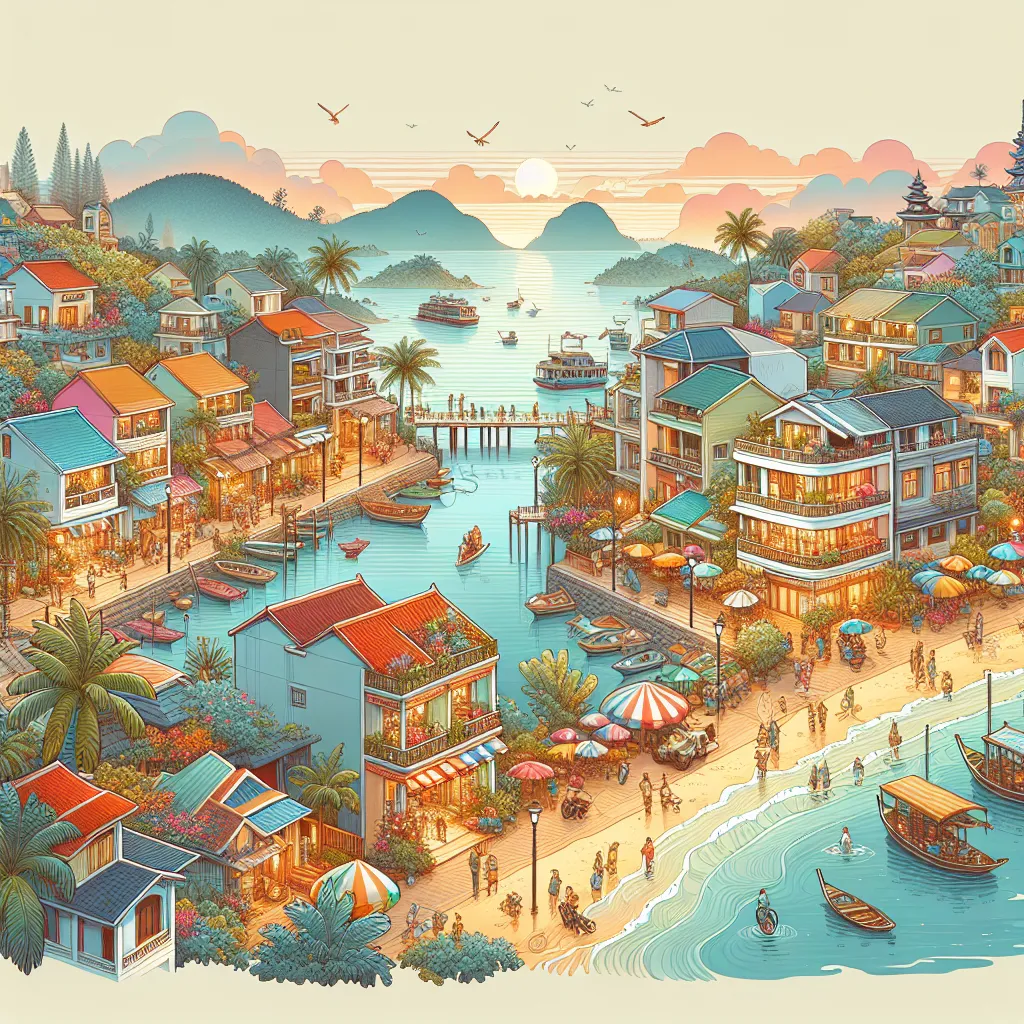How is the real estate market in Vietnam changing for foreign investors?

- What are the current trends in the real estate market in Vietnam today?
- What is the maximum duration of land lease in Vietnam?
- How is the real estate market in Vietnam developing and what are its prospects for investors?
Market analysis of real estate in Vietnam
Today, Vietnam is no longer the country where buying real estate at a good price is commonplace. The situation with prices has undergone significant changes, and the cost of properties in resort areas has increased considerably, which is linked to the active growth in the number of tourists eager to enjoy a vacation in this country.
For example, in the heart of Da Nang, one of the major cities on the coast of the South China Sea, you can come across apartments with an area of 100 square meters, priced at around190,000 US dollarsIf you're interested in larger options, a villa with an area of 276 square meters located eight kilometers from the city center will cost approximately830,000 dollarsAt the famous resort of Hoi An, a villa covering 610 square meters costs around1.75 million dollars...while in Nha Trang you can find a house with an area of 250 square meters for around...340,000 dollars.
Discussing megacities like Hanoi and Ho Chi Minh City, Andrey Ryabov, the manager of Calisto Corporation Ltd, points out that the real estate market in these cities is very overheated.
Resorts and investments
The most attractive for foreign investors are the coastal resorts of Vietnam, located along the South China Sea coast.
- It is here that foreign developers are actively engaged in the construction of various properties: hotels, villas, townhouses.
- Entertainment and sports complexes are being created.
According to Andrei Ryabov, the country's government is focusing on the development of the tourism industry, which has become one of the key areas in the economic strategy, consistently supporting the growth of this sector.“Real estate prices in such areas are constantly rising, making investments more attractive. Moreover, investor confidence is boosted by the stable political situation and positive economic dynamics in the country.”", he adds.
Promising resorts
In addition, investors continue to show active interest in resorts such as Danang, Mui Ne, Hoi An, Vung Tau, and Nha Trang. Dmitry Andreev, the director of the financial department at Mirax Group, emphasizes:
- Nha TrangAs a tourist destination, it started to actively develop just a few years ago, and government support for this region is very noticeable.
- “Many experts consider Nha Trang to be the most promising destination for dynamic growth in the tourism and infrastructure business.”
- The opening of Cam Ranh International Airport is expected in early 2010, which will undoubtedly significantly increase tourist traffic.
Restrictions for foreign investors
Nevertheless, despite the government's efforts, there are restrictions on the rights of non-residents to purchase real estate. One of the most significant limitations is that foreigners cannot freely own land and are forced to enter into long-term lease agreements, which applies to all segments of the real estate market.
These limitations should be taken into account when developing investment strategies, as they affect the plans of foreign nationals looking to integrate Vietnam into their investment portfolio.
Maximum duration of land lease
The maximum allowable lease term for land in Vietnam is seven decades. This information was provided by Patty Joslyn Ndzana Etoga, the deputy director of the marketing and design department at the consulting company CB Richard Ellis Vietnam Co., Ltd. She noted that the process of liberalizing the real estate market for foreign investors is ongoing, and opportunities for non-residents to gain full ownership rights to property in the country may arise in the near future. This will significantly enhance the attractiveness of the Vietnamese market for foreign capital investments.
The history of the opening of Vietnam's economy
In the early 2000s, the Vietnamese government began taking steps towards gradually opening up the economy. One of the key events was the introduction of a law in May 2007 that allowed foreigners to lease land plots for an unlimited period. Initially, such leases are granted for 50 or 70 years, with the possibility of extending for the same term at no additional cost. Since all land in the country is owned by the state, this law provided equal conditions for both local residents and foreign citizens regarding property rights.
New opportunities for foreign citizens
Since the beginning of the year, another important law has come into effect, which allows specific categories of foreign citizens to acquire real estate in the form of apartments. However, under the terms of this law, such properties must be resold or gifted after 50 years. This opportunity is available for:
- private investors;
- owners of Vietnamese companies;
- foreigners who have made special contributions to Vietnam;
- spouses of Vietnamese citizens.
Expert opinion
Expert Andrey Ryabov believes that the existing restrictions on ownership of real estate for foreign investors can be offset by active measures from the Vietnamese government aimed at creating more favorable conditions for attracting investments and expanding the rights of non-residents. Despite the current barriers, Ryabov is confident that opportunities for foreign investors will significantly increase in the future.
Economic growth of Vietnam
Over the past five years, the economy of the Socialist Republic of Vietnam has shown stable growth, averaging around 7% per year, which has contributed to an improvement in the quality of life for the population. The Vietnamese dong has strengthened its position against the dollar, and land prices have been steadily rising.
29 September
9 October 2024
9 October 2024


Growing interest in real estate in Vietnam
Interest in purchasing real estate in Vietnam among foreign citizens has significantly increased due to recent changes in legislation. The introduction of a new government regulation that allows Vietnamese citizens with foreign passports to acquire property opens up opportunities for more than three million interested buyers.
The increase in demand for housing is accompanied by a tense situation in the market with limited supply, which creates positive expectations regarding the future development of the sector, comments Andrey Ryabov.
Real estate market development
The real estate market in Vietnam is currently continuing to develop actively. However, investors should not expect instant profits from their investments, as opportunities for speculative deals are quite limited here.
Patti Joslyn Ndzana emphasizes that:
“The Vietnamese market has investment appeal, but it is important to understand that gaining access to a project and exiting quickly will not be possible.”Vietnam, as a developing country, carries certain risks that are often higher than those in more mature markets. While many investors hope for a swift progression, the actual pace of development tends to be significantly slower.
Investor concerns
Some experts, analyzing the current market conditions in Vietnam compared to other regions, argue that investors' concerns are not always justified. Dmitry Andreev emphasizes:
“The development of the economy and the maturity of the market do not guarantee successful investments, as clearly demonstrated by the mortgage crisis in the USA and the UK.”Despite the existing concerns about the youth of the Vietnamese market, government policy actively protects investments from serious negative consequences. The state regulation strategy aimed at attracting foreign capital makes Vietnamese real estate one of the most resilient in the region.
The role of the government in the real estate market
Experts believe that an active government stance helps protect against unexpected economic crises.
- There is no basis for the assumption that the government may start confiscating private property.
- In the current circumstances, government control over the real estate sector is seen as a positive development for Vietnam.
- Investors can expect relative stability and predictability, which is important for an emerging market.
Restrictions on foreign investors
Government regulation also limits the influence of foreign investors, who could potentially trigger a real estate market overheating in the resort areas along the South China Sea. This creates conditions for long-term planning and enhances the sector's attractiveness for strategic investments.
Prospects of the Vietnamese real estate market
Thus, the current state of the Vietnamese real estate market looks promising, despite all the challenges and risks inherent in developing countries.
Conclusion
In conclusion, I want to emphasize that the real estate market in Vietnam is undergoing significant changes, moving away from being the inexpensive country that many remember. Modern housing prices, especially in resort areas, are rising, which is linked to both the increase in the number of tourists and the growth of domestic demand. The investment climate here is becoming increasingly attractive, despite the existing restrictions for foreign citizens. The process of opening up the market, actively supported by the government, promises to provide foreign investors with more opportunities for investment in the future.
Attractive resorts for investment
I see that at the moment the most attractive resorts are:
- Danang
- Nha Trang
- Hoi An
- Mui Ne
- Vung Tau
Where the government is focused on developing tourist infrastructure and creating comfortable conditions for recreation and living. With Vietnam being recognized as one of the leaders in economic growth in Southeast Asia, I believe this country could become an important hub for international real estate investments. Understanding the local context, legislation, and economic trends will be crucial for those intending to invest here.
The future for foreign investors
I hope that in the coming years, the restrictions on property purchases for foreigners will become less strict, making Vietnam even more attractive to foreign investors. Investments in this country could prove to be quite profitable for those who are willing to wait a bit, as the prospects for economic growth remain clear, and the age of real estate investments can only increase.
Conclusions
In the end, I am convinced that Vietnam has every chance of becoming a true..."dividend paradise"for lucky investors.
Comment
Popular Posts
29 September
375
9 October 2024
9940
9 October 2024
1485
Popular Offers

Subscribe to the newsletter from Hatamatata.com!
Subscribe to the newsletter from Hatamatata.com!
I agree to the processing of personal data and confidentiality rules of Hatamatata











